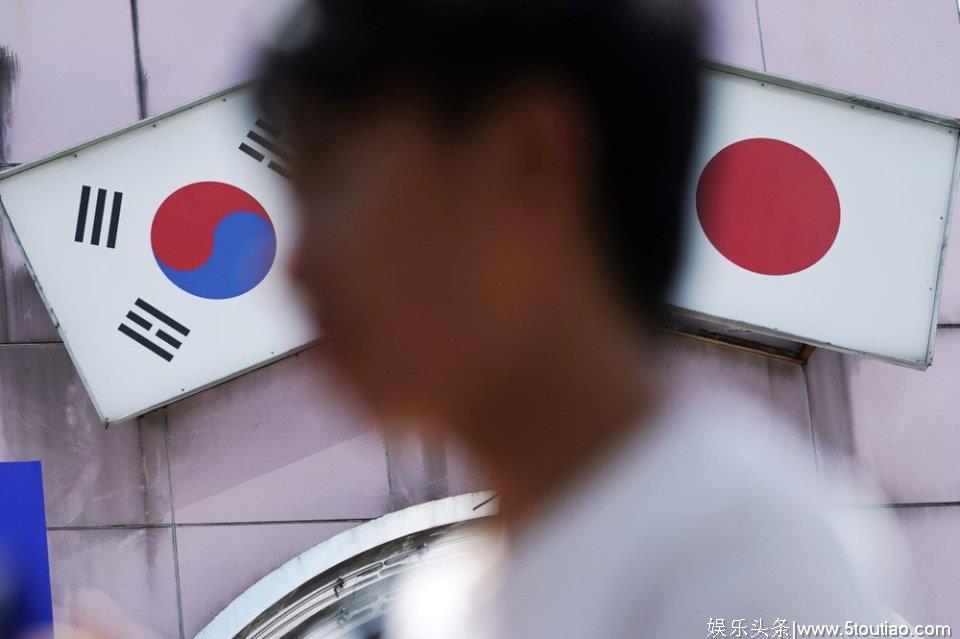There's history behind worsening Seoul-Tokyo trade dispute
不断恶化的日韩贸易争端背后有其历史原因
来源: 美联社 翻译:世界播

Tokyo’s moves to impose trade curbs on Seoul have struck a nerve in South Korea, where many people still harbor resentment over Japan’s brutal colonial rule from 1910 to 1945 and feelings that Japan hasn’t atoned enough for its wartime past. From Japan, there’s annoyance about the perception that Seoul continuously keeps alive history issues that Tokyo, which has repeatedly expressed remorse for its wartime actions, says have been settled.
日本政府对韩国实施贸易限制的举动触动了韩国的神经。许多韩国人仍对1910年至1945年日本残酷的殖民统治心怀怨恨,他们认为日本没有为其战时所犯下的过错做出足够的补偿。而来自日本的不满则是,他们认为首尔方面一直执着于历史问题,但东京此前曾多次对其战时行为表达过悔恨,并称这些问题已经得到解决。
Despite recent conciliatory rhetoric from Seoul, difficult relations could continue as decades of mutual frustration over history come to a head.
尽管首尔方面最近发表了和解言论,但随着几十年来双方对彼此历史纠葛的失望已经达到了顶点,两国间的艰难关系可能会继续下去。
Here’s a look at the source of the troubles between Seoul and Tokyo:
以下是首尔和东京之间问题的根源:
South Korea’s relations with Japan have never been great, but their interdependence in trade and vibrant exchanges of pop culture and tourism had softened political anger in past years.
韩国与日本的关系向来不好,但两国在贸易上的相互依赖,以及流行文化和旅游业的活跃交流,这在过去几年里疏缓了政治上的愤怒。
Not anymore.
然而今时不同往日。
Thousands of South Koreans have taken to the streets to protest Tokyo’s move to tighten controls on exports to South Korea, where major manufacturers like Samsung heavily rely on materials and parts imported from Japan.
数以千计的韩国人走上了街头,抗议东京收紧对韩国出口控制的举措。在韩国,三星等主要制造商严重依赖从日本进口的材料和零部件。
Seoul has accused Tokyo of weaponizing trade to retaliate against South Korean court rulings calling for Japanese companies to offer reparations to South Koreans forced into slave labor during World War II.
首尔指责东京将贸易武器化,以报复韩国法院要求日本企业向二战期间被迫沦为奴隶的韩国人提供赔偿的裁决。
Sales of Japanese beer, clothes and other goods have declined sharply as have travels to Japan amid boycott campaigns. Some gas stations have refused to fuel Japanese cars. A restaurant and a museum put up signs that Japanese visitors weren’t welcome.
由于抵制活动的影响,日本啤酒、服装和其他商品的销量大幅下降,前往日本的游客也减少了。一些加油站拒绝给日本汽车加油。一家餐馆和一家博物馆张贴告示,表示不欢迎日本游客。
Many South Koreans believe Japan’s past expressions of regret lacked sincerity or were ruined by conservatives who’ve continued to play down or question Japan’s wartime past. There’s also frustration over a view that Japanese school books sugarcoat past brutalities.
许多韩国人认为,日本过去表示悔恨的方式缺乏诚意,或者被一直在淡化或质疑日本战时历史的保守派毁掉了。还有一种观点认为,日本教科书粉饰了过去的暴行,这令人相当失望。
Questions about Japan’s sincerity were also raised over a 2015 agreement that the administration of conservative Japanese Prime Minister Shinzo Abe reached with Seoul’s previous conservative government to send 1 billion yen to a foundation established to compensate South Korean women who were forced to work at Japan’s World War II military brothels.
2015年,保守派日本首相安倍晋三的政府与首尔之前的保守派政府达成协议,同意设立一个10亿日元的基金,以补偿被迫在日本二战期间的军事妓院工作的韩国女性,这也引发了对日本诚意的质疑。
Many South Koreans saw it as Tokyo’s attempt to buy the silence of victims.
许多韩国人认为这是东京试图让战时受害者保持沉默的手段。
There’s a “perception among South Koreans that Japan will try to solve everything with money without repenting its past,” said Lee Shin-cheol, a historian at Seoul’s Sungkyunkwan University.
首尔成均馆大学历史学家李信哲(音译)表示,“韩国人有一种看法,认为日本准备用金钱解决一切问题,并且不会对过去的罪行进行忏悔。”
Weeks after angrily declaring that South Korea will “never again lose” to Japan, South Korean President Moon Jae-in on Thursday used the 74th anniversary of Japan’s World War II surrender to extend an olive branch, saying Seoul will “gladly join hands” if Tokyo wants to talk.
就在韩国愤怒地宣称将“永远不再输给”日本数周后,韩国总统文在寅上周四在日本二战投降74周年之际向日本伸出了橄榄枝,表示如果东京方面愿意对话,首尔方面将“愿意配合”。
Nevertheless, thousands of people later marched through heavy rain in Seoul, carrying signs that said “Apologize for War Crimes” and “We Denounce Abe.”
然而,数千人随后冒着大雨在首尔游行,并举着写有“为战争罪行道歉”和“我们谴责安倍”的标语。
Japan, which has denied that its trade curbs were retaliation over the history row, claims all compensation issues were settled when the two countries normalized relations under a 1965 treaty. But South Korea’s Supreme Court last year ruled that the deal did not cover individual rights to seek reparations.
日本否认其贸易限制是对历史争端的报复,日方声称,根据1965年达成两国恢复外交关系的条约,已经彻底解决了所有历史赔偿问题。但韩国最高法院去年裁定,该协议不包括个人寻求赔偿的权利。
For decades Japan has struggled to face up to past atrocities and abuses, with some people saying that massacres were exaggerated or characterizing colonization as a positive act that helped Korea to modernize, according to Masaru Tonomura, a history professor at the University of Tokyo.
东京大学历史学教授田村昌(音译)表示,几十年来,日本一直难以正视过去的暴行和滔天罪行,一些人说,大屠杀被夸大了,或者把殖民主义描述为有助于韩国现代化的积极行为。
Many Japanese, he said, see themselves more as victims than perpetrators of imperialism and militarism.
他指出,许多日本人把自己更多地看作是帝国主义和军国主义的受害者,而不是实害者。
Some of Japan’s views on history could be seen recently when throngs of people flocked to Tokyo’s Yasukuni Shrine to pay respect to war dead, some carrying the rising-sun flag and banners that said, “Banzai to the emperor.”
最近,当成群结队的人涌向东京的靖国神社悼念战争亡灵时,我们很容易就能看出日本对历史的一些看法,其中一些人举着升起的太阳旗和写着“天皇万岁”的横幅。
“It is shameful our prime minister can’t be here,” Hirotomi Igarashi, a construction company owner who heads a right-wing group, said, referring to how Abe has for years avoided Yasukuni on Aug. 15, the day of Japan’s World War II surrender. Abe, who counts heavily on the support of conservative Japanese, has sent gifts instead. “It’s because China and Korea won’t stop screaming.”
建筑公司老板、右翼团体的负责人伊加拉希(音译)说道:“我们的首相不亲自来这里实在是太不像话了”,他指的是安倍多年来一直避免在8月15日日本二战投降日参拜靖国神社。而在很大程度上依赖日本保守派支持的安倍虽未亲自到场,但却献上了祭祀费。“这是因为中国和韩国不会停止厉声斥责。”
Yasuhiro Yagi, the leader of a small anti-Korea group, believes that accounts of Japan’s cruelty during World War II were fabricated.
一个小型反朝组织的领导人八木康裕则认为有关日本在二战期间暴行的历史是捏造的。
Japanese leaders, officials and emperors have issued apologies for the war. In 1995, Prime Minister Tomiichi Murayama issued a statement that vowed to never repeat the mistakes of war. Earlier statements by government spokesmen Koichi Kato and Yohei Kono acknowledged military involvement in the sex slaves system.
一些日本领导人、官员和天皇都已经为战争进行了道歉。1995年,时任日本首相的村山富市发表了声明,发誓绝不重蹈战争的覆辙。日本政府发言人加藤浩一(音译)和河野洋平(音译)在早些时候的声明中同样承认,日本战时军队参与了慰安妇制度。
Some Japanese are opposed to Abe’s policies and think Japan should work harder to patch up relations with South Korea. Dozens of people protested outside the prime minister’s residence earlier this month to urge Tokyo to reverse the downgrading of South Korea’s trade status and to apologize for wartime atrocities.
一些日本人反对安倍的政策,认为日本应该更加努力地修补与韩国的关系。本月早些时候,数十人在首相官邸外举行抗议,要求东京方面撤销对韩国贸易地位的降级,并为其战时暴行道歉。
But the protesters, who included members of Christian groups, activists and labor unionists, are seen as fringe by many in Japan.
但是,包括基督教团体成员、活动人士和工会成员在内的抗议者被许多日本人视为边缘群体。
In Tokyo’s Shin Okubo district, which bustles with Korean restaurants and stores selling K-pop merchandise, Nagisa Sato, 25, said she comes to the area about once a week because she loves spicy food and South Korean movies and music.
在东京新大久保区,韩国餐馆和销售韩国流行商品的商店里熙熙攘攘,25岁的佐藤永久(音译)表示,她大约每周来这里一次,因为她喜欢辛辣的食物、喜欢韩国电影和音乐。
“The people are so kind,” she said of her experience during a visit to South Korea. “What you see on TV isn’t all there is.”
“这里的人都很善良”,她在谈到自己去韩国游玩的经历时说道:“你在电视上看到的并不是全部。”


